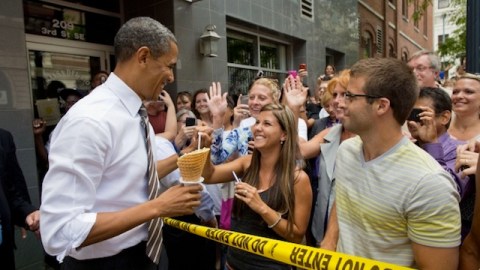Turn Off the Election Coverage

Sometimes what political science tells us is that we should pay less attention to politics. It’s easy to get caught up in the horse race aspect of the presidential election, especially since the news media has an incentive to exaggerate the importance of every gaffe and every piece of preliminary economic news. But the evidence is that what happens four months ahead of a presidential election doesn’t matter very much.
Right now President Obama has a moderate lead over Mitt Romney in the polls. The election is likely to be close, but the smart money considers Obama the favorite in spite of a bad economy. That’s because Obama can afford to lose a few swing states this year, but Romney’s margin of error is thinner. Traders at the political futures market Intrade give Obama a 55% chance of getting reelected. And Nate Silver’s election model currently gives Obama a 66% chance of winning.
Outside of those rough estimates, there’s not much we can say. It certainly sounded bad when Obama said “the private sector is doing fine” at a press conference in June. But for all the commentary that statement generated, it is unlikely to lose him many swing votes. Likewise, it made good copy that Romney was booed at the NAACP convention for saying he would repeal Obamacare. Romney’s suggestion that supporters of Obamacare simply want “free stuff” probably tells us something about his attitude and his campaign strategy. But the incident is unlikely to have much effect on Romney’s chance of getting elected.
The fact is that most of what happens over the summer will be forgotten by November. The evidence is that voters are mostly swayed by what happens in the month or two before the election. Ronald Reagan famously asked voters in 1980 to consider whether they were better off than they were four years before. But work by Christopher Achen and Larry Bartels found that voters mostly worry about whether they are better off than they were six months before the election. Likewise, political operatives like to believe that their campaign ads determine elections, but the evidence is that campaign ads generally do not have much effect more than a week before an election. Even the substantial “bounce” that presidential campaigns get from their party conventions appears to fade after about a month.
As John Sides says, three factors probably do matter right now: the broad economic trends, the overall level of campaign spending, and campaign efforts to mobilize their supporters. Everything else may make for good reading, but probably won’t make much difference on election day.
Follow me on Twitter: @rdeneufville
President Obama image from Pete Souza




